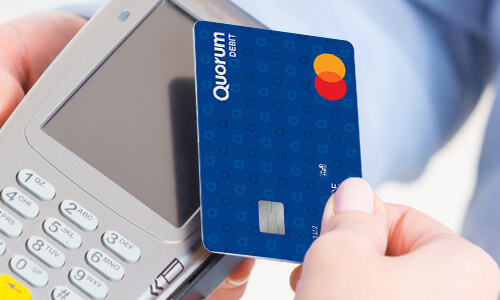Your checking account sees a lot of activity. From buying things with your debit card and paying bills by check or through Bill Pay to depositing funds from your employer and other sources, money regularly goes in and out. Knowing what your financial institution means by your available balance can keep you from overdrawing your checking account and incurring nonsufficient fund (NSF) or overdraft fees.
Your Available Balance Explained
When you log into online or mobile banking, your bank or credit union shows an available balance and a current balance for your checking account, amounts that aren’t always the same. If you maintain a check register, the amount you’ve calculated as your balance may not match either of the balances listed by your financial institution. Why are they all different?
Your current balance per your bank or credit union reflects all purchases and deposits that it has fully processed.
Your available balance is your current balance less any pending transactions. These include recent check and debit card purchases that have been sent to but not fully cleared by your financial institution, so it sets aside the money in your account while it completes the transfer. Some merchants, like hotels and car rental agencies, request that more than the purchase amount be set aside in case you damage their property. These damage holds are deducted from your current balance until you check out of the hotel or return the rental car.
As for the current balance that you show in your check register, it may include additional purchases that haven’t reached your financial institution yet, such as a check to pay your electric bill that’s still in the mail or a debit card transaction that the merchant still hasn’t reported.
Transactions Affecting Your Available Balance
More specifically, here’s how various transactions affect your available balance.
Deposits
When you deposit money into your account, your financial institution is allowed to place a hold on it per federal Regulation CC to ensure the funds are available in the payee’s account. Banks and credit unions are allowed to set their own hold times (published in their Funds Availability policy) as long as they don’t exceed Reg CC’s maximum limit.
This means that if you deposit money in your account, it isn’t necessarily available to you right away. Deposit receipts often tell you when your funds will be fully available, which is typically within one to two business days unless it’s a deposit over $5,250 or you have a history of overdrawing your account. When you look at your account, your available balance won’t reflect a deposit until the hold expires.
Debit Card Transactions
When you use your debit card at a store, restaurant or other business, the merchant has to send the transaction to your financial institution to get paid. With some merchants, this occurs almost instantaneously, but with others, it’s delayed by a few days.
Here’s a real-world example: Bob has $500 in his account and deposits $500 more on Monday night. Per his financial institution’s funds availability policy, $200 of that deposit will be available to him on Tuesday and the rest on Wednesday. If Bob logs into his landlord’s portal on Monday night to pay $950 in rent with his debt card, his available balance is still only $500 and his account will be overdrawn if the landlord’s system reports the $950 immediately.
Zelle® Transactions
When you use the person-to-person (P2P) mobile payment app Zelle® to pay family or friends, the transfer moves directly from your institution to theirs within minutes. If Bob’s aunt is his landlord in the above example and he uses Zelle® to pay her his rent before his $500 deposit is fully available to him, he’ll also overdraw his account.
Bill Pay Transactions
When you schedule a payment through Bill Pay, your financial institution sets aside that money, deducting it from your current balance. In Bob’s case, if he arranges to pay his rent through Bill Pay before his $500 deposit has fully cleared, he’ll once again be overdrawn.
Checks
When you pay a merchant with a check, they often use the details on it to convert it to a type of electronic transfer called an ACH transaction because it’s an easier, cheaper and faster way to process the payment. If Bob drops off a check at the property management office on Monday night and they convert it to an ACH when his available balance still shows only $500, he’s got the same insufficient funds problem.
If Bob mails his rent check to an out-of-state address for his landlord, his deposit may be fully available to him before his check is delivered and processed. However, it’s unwise to count on that.
How to Avoid Overdrawing Your Account
There are several things you can do to avoid Bob’s overdrawn situation. Check your available balance often, especially before making purchases or paying bills when your budget is tight. If you can, save up a buffer amount to keep in your account that you never spend. And finally, consider opting for overdraft protection to avoid fees in situations where you inadvertently spend more than your available balance.
Editor’s note: Quorum is not affiliated with any of the companies mentioned in this article and derives no benefit from these businesses for placement in this article.






Comments Section
Please note: Comments are not monitored for member servicing inquiries and will not be published. If you have a question or comment about a Quorum product or account, please visit quorumfcu.org to submit a query with our Member Service Team. Thank you.